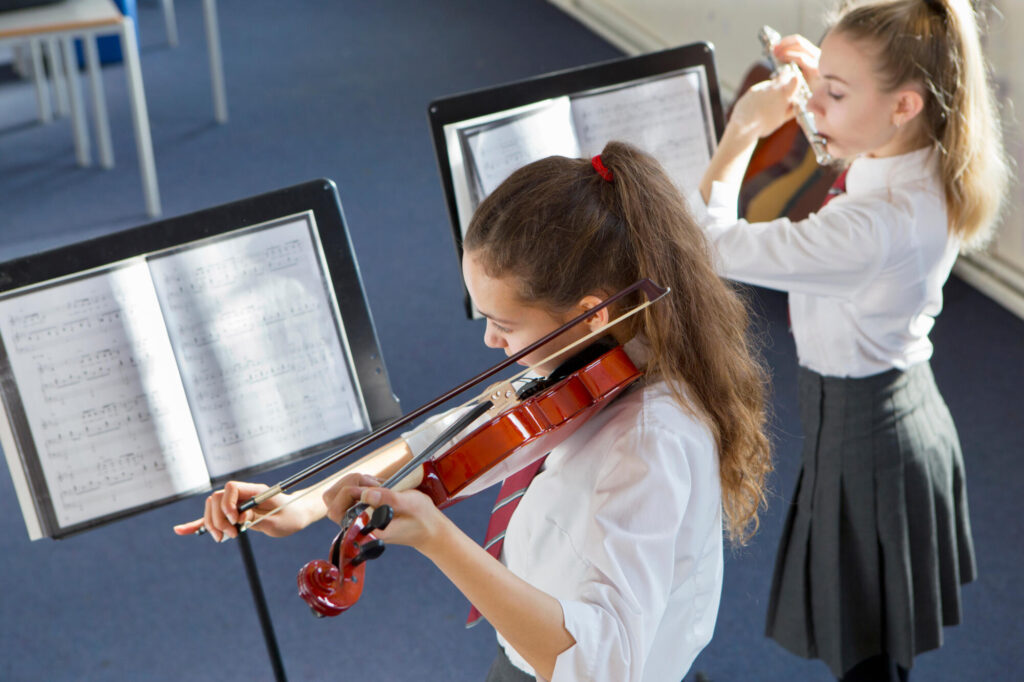Music education begins with listening. Before a student plays an instrument or sings a note, they learn to hear. They listen for cues, rhythm, and the spaces between. This kind of listening builds understanding, one of the deepest roots of leadership.
As children learn, they notice how one sound connects to another, how one small mistake can change the whole. This awareness grows into teamwork. A musician knows when to lead and when to blend in, just as a true leader knows when to speak and when to listen. In every note, patience, focus, and quiet strength take shape. Read on.
Confidence Found in Every Note
Confidence is often built in small, unseen ways. For students in music, it comes through repetition, practicing scales, memorizing lyrics, and mastering transitions. Each improvement becomes proof of what effort can achieve.
Performing in front of others also becomes an act of courage. Standing on a stage, facing an audience, and sharing something deeply personal requires more than talent-it demands self-belief. The first time a child performs, they may tremble. But with every performance, their confidence grows.
This growth doesn’t stay within the walls of a music room. It spills into daily life. That same student who once feared missing a note learns to speak up in class, share ideas in a group, and handle mistakes with grace. Music gives them a safe space to fail, to recover, and to try again. That resilience is the rhythm of leadership.
Harmony Begins with Teamwork
No orchestra, choir, or band can succeed without unity. Music students quickly discover that their success depends on others. The violinist must match the pianist’s tempo, and the singer must follow the conductor’s cues. Every role matters.
This balance teaches responsibility-each person’s effort affects the whole. It’s not about being the loudest instrument, but the one that fits best in harmony. Through this, children learn collaboration, accountability, and respect.
Lessons in Collaboration and Compassion
In a group rehearsal, disagreements arise. Some want faster tempos, others prefer slower ones. Learning to compromise without losing the beauty of the piece mirrors real-world leadership challenges. Leaders who emerge from music understand how to guide teams toward one shared goal while keeping individual voices valued.
Schools that integrate creativity and discipline, such as ExcellED Montessori Plus, understand that leadership begins with self-awareness and empathy skills nurtured naturally through music. These students do not just learn songs; they learn how to collaborate, listen deeply, and lead with compassion.
Imagination at the Heart of Leadership
Leadership isn’t only about direction-it’s also about imagination. The world changes fast, and leaders must adapt, invent, and inspire. Music nurtures that creative core, teaching children to explore new ideas with curiosity and courage.
When a child improvises, they take what they know and transform it into something original. This act of creation mirrors how leaders solve problems by seeing possibilities where others see limits. A good musician looks beyond notes, a good leader looks beyond obstacles.
Emotion, Vision, and the Art of Decision
Music invites emotional intelligence. Through sound, children learn to express and understand feelings-their own and those of others. This empathy becomes the bridge that connects leaders to their teams, helping them motivate and inspire with heart.
Even composing a short melody requires both structure and vision. Every decision-a change in rhythm, a subtle tone-shapes the outcome. In this way, music reflects the art of leadership, where thoughtful choices and creative insight guide the path forward.
The Rhythm of Discipline
Leadership without discipline loses direction, and music without discipline loses beauty. Both require focus, consistency, and dedication. Music practice is daily, deliberate work-tuning strings, repeating passages, refining rhythms until everything aligns.
Through this process, students learn persistence, time management, and that progress comes in small, patient steps.
Responsibility in Every Beat
The discipline learned through music becomes the foundation for leadership. When challenges arise, students draw on the same perseverance that helped them perfect a performance. They understand that steady effort creates strong results.
Music also teaches respect for time, both their own and others. Rehearsals demand punctuality and dependability. A single delay can disrupt an entire group, showing how every role carries weight. From these lessons, children grow into dependable leaders who value commitment, responsibility, and teamwork.
From the Classroom to the World
As music students grow, they carry their training into other parts of life. The lessons learned while tuning an instrument or mastering a difficult chord become tools for navigating complex challenges.
A student who once coordinated with peers to play a duet later uses those same skills in team projects. The rhythm of leadership they’ve internalized-listening, guiding, balancing-remains with them.
Beyond technical skill, music fosters humility. Every musician knows there’s always something more to learn, another layer to explore. This attitude keeps leaders grounded, open to feedback, and eager to keep improving.
When young learners experience music education within an environment that values both independence and collaboration, their leadership potential multiplies. They grow not only as artists but as thinkers, dreamers, and doers.
Why the Connection Matters
In today’s fast-changing world, knowing facts is not enough. People need emotional understanding, creativity, and teamwork to grow and lead. Music helps build all these skills at the same time.
It connects the mind and the heart. It trains the hands and shapes the spirit. It calls for both discipline and imagination. A child learning music is not just getting ready for a performance-they are learning how to face life.
Music’s rhythm teaches steady effort. Its harmony shows the power of working together. Its quiet moments teach patience. All these lessons build a strong base for leadership that can last a lifetime.
Where Leaders Are Composed
Every song starts with one note, and every leader starts with one lesson. Music turns that lesson into something alive, teaching courage, kindness, and vision all at once.
Through music education, children find their voice. Through leadership, they learn how to share it. In that space where creativity meets purpose, they begin to see what they can truly become.
The next time you hear a young musician play, listen closely. Behind every melody, a future leader is taking shape.
For more on this content, visit the rest of our blog!






